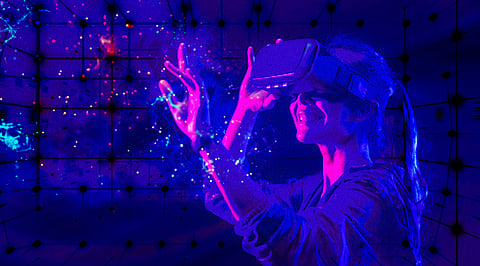
- Insights
- Cryptocurrencies
- Stocks
- White Papers
- Industry
- Geography
- Insights
- Cryptocurrencies
- Stocks
- White Papers
- Industry
- Geography


In innovation, first-mover advantage is quite crucial. For this reason, various online platforms are starting to acquire programming organizations to situate themselves for the appearance of the Metaverse. They desire to be at the front line of significant changes that the Metaverse will bring in relation to advanced collaborations between individuals, among organizations, and between them both. What is the Metaverse? It is a combination of virtual reality (VR) and augmented reality (AR), which will be created as a layer of abstraction above the physical world and interoperate with how we currently live. What's certain is that the metaverse will be a new paradigm where our digital and online lives converge.
It no more remains an innovation but is upgraded to on-ground application, which means the possibility of the metaverse invading the real world is drawing nearer. Since the beginning of the pandemic, many individuals have progressively ended up carrying on with their lives on the web. We have progressively got used to working, shopping, and mingling digitally, so bringing these activities together in one consistent digital environment is not as much of a leap as it would have seemed a few years ago.
In any case, these progressions bring cultural difficulties, as well. The shift to web-based living has obviously empowered plenty of activities that can be harmful or unfortunate, from data fraud and extortion to trolling and abuse. There's likewise a risk that real-life inequalities such as the wealth divide will be replicated inside the metaverse. Immersive 3D environments require a lot of computer power to generate, meaning that those with less budget to spend on headsets and computer equipment might have a better experience. Contrarily, this could wind up affecting society if, for instance, organizations settled on hiring decisions based on a person's presence in the metaverse, or it turns into a channel for the conveyance of education, training, or even dating opportunities.
Various platforms are discovering opportunities to attract more consumers with the help of metaverse. The UAE's Ministry of Health and Prevention (MOHAP) unveiled MetaHealth, the world's first metaverse customer satisfaction service center to address customer requirements in a three-dimensional (3D) space. The VR-powered service displays customers' real faces instead of avatars and allows them to communicate with a real employee, who can handle associated questions, services, and duties.
Tech-savvy companies have begun to don virtual reality/augmented reality equipment and engage with brands, their grandchildren, and one another while immersed in the growing metaverse. Virtual reality companies catering to senior citizens have emerged as a result. For example, US-based Rendever provides Virtual reality or augmented reality equipment to senior living communities, giving residents the opportunity to enjoy immersive virtual entertainment and travel experiences.
Meta has launched the Horizon Workrooms app to offer employees virtual office space for team collaboration. The virtual meetings are accessible via laptop through video call or by using Quest 2 headsets. It gives a personalized feeling as the user can interact with employee avatars and perform office activities such as taking down notes, file sharing, and chatting in a virtual space, intended for effective team collaboration.
Soul Machines is a New Zealand-based company that says it's designing AI-driven digital humans for clients to use for things like customer service, promotional videos, and education. However, the company also has its sights set on the future — with co-founder Greg Cross saying it plans to create a "digital workforce" for a potential metaverse, according to The Verge.
Soul Machines is creating digital people run on a system known as Humans OS 2.0. It's an "Autonomous Animation Platform" with a digital brain that allows the AI to learn from its interactions with real people, according to its website. AI will be able to fulfill the future needs of humans, in and out of the metaverse — or even duplicate them.
